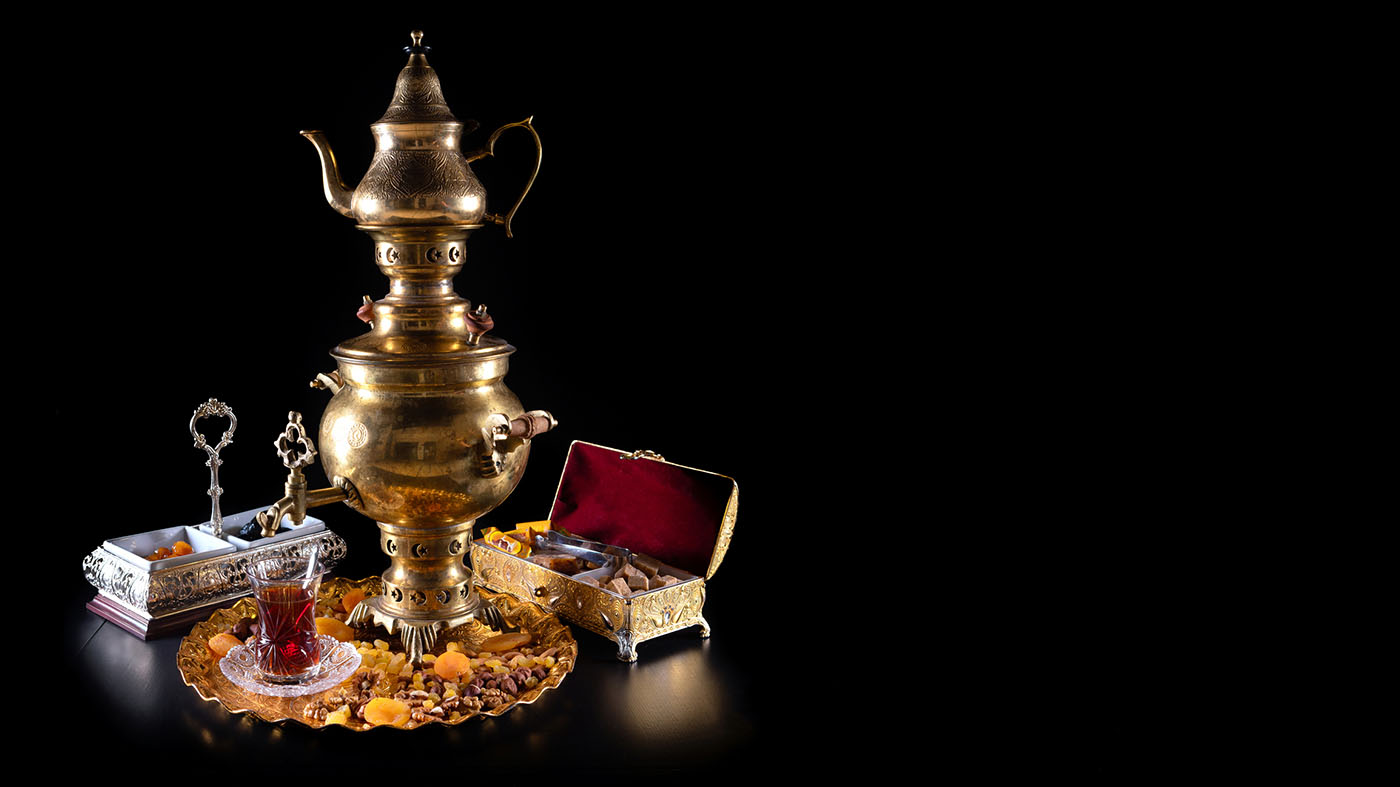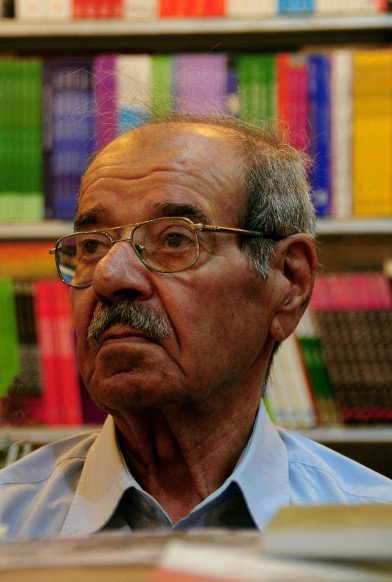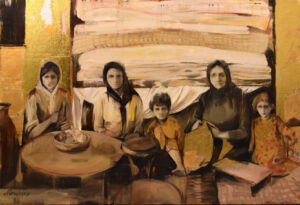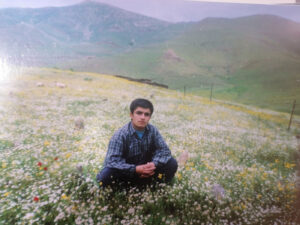“Sweet Tea” is regarded by many as one of the finest Kurdish short stories and The Markaz Review presents its first translation into English. Written by Hussein Arif during his time as a soldier in southern Iraq, “Sweet Tea” has held a special place in Kurdish readers’ hearts for decades, and it earned him first place in the Shafaq Award. Arif’s writing style embraces a simplicity that enhances the beauty of the narrative of the story. Rooted in the daily life of Kurdish society and culture, the story draws from Arif’s own life experiences.
Hussein Arif
Translated from the Kurdish by Jiyar Homer with Hannah Fox
I’m shocked! Today, unlike every other day, the old, dented samovar urn has transformed into a charming fiddle, pouring the finest melodies into my inner being. The grimy teapot that once disgusted me now appears so sweet and clean. Even the skittish teacups, the rusty water bowl, and the unsightly sugar bowl now look like they’ve emerged from the waters of beauty and are beaming at me. I can’t tell whether I’m the one laughing hysterically at the tea set or if it’s laughing at me! Today I feel like a powerful force has taken root in my heart and consciousness, and it’s making me restless. If not, why would this quartet of tea drinkers — myself, my master, his wife, and their daughter Aftaw — have caused me so much annoyance and humiliation before today? It felt as though they were hovering over me with a club, forcing me to drink tea. Yet today, all the motion and commotion of the samovar is tickling my conscious and subconscious. Before today, I was impatient and restless from my shyness and shame. Today the magical force that has excited my soul and mind is making me restless.
While sitting in silence in the corner where I always sit, talking to myself like this, Aftaw and her mother were arranging the tea set in the usual way. The coal lumps inside the samovar started to crackle and hiss, the water stirring slowly and whistling like a tender melody. At any moment it would burst into a frenzy of bubbles. Unconsciously, a deep giddiness was taking me away as yesterday’s catastrophe kept intruding into my thoughts again and again…
Yes, it was at this time yesterday that the four of us had gathered around the old samovar. The command from my master’s wife to Aftaw still resonates in my ears, “Come on, pour them the tea!”
Then Aftaw prepared the teacups just like she did on any other day. Why did she always specifically wash one of them more carefully than the rest? She even spooned twice as much sugar into this teacup as the others! How foolish I was! I had seen Aftaw’s ritual every single day, yet I’d never stopped to ask myself why these actions were part of her daily routine and what they might mean.
The tea was served. The special tea glass found its way to me, just like every other day. She’d repeated this action a hundred times, and I too had repeated mine a hundred times. I placed the tea back, saying, “My tea is once again too sweet. Spoon a little plain tea in it.”
But Aftaw, my Aftaw, cast me a secret, spiteful glance. She pouted at me as she snatched the tea away, offended. It seemed her aggressive reaction was the result of long-suppressed emotion. I noticed that instead of simply topping up my glass with plain tea, she poured so much it overflowed onto the saucer. Of course, now it was undrinkably bitter. A wave of fury overcame me, and I said to myself, “God! See how I have to put up with this cunning girl!” I managed to restrain myself. If it wasn’t for the shame, I would have thrown the tea in her wicked face and made her regret her actions. However, my master’s wife, as if sensing her daughter’s mischief, asked me sweetly, “I hope your tea isn’t too bitter now?”
Meanwhile, I noticed Aftaw narrow her eyes at her mother, as if to imply that it had been my fault and not hers. Feeling embarrassed, I had no choice but to respond, “No… It’s quite good now.”
Despite not being able to utter a word, I gulped down two more glasses of the same tea. With each glass that Aftaw poured for me, I would catch a glimpse of the master’s wife casting sideway glances at her daughter, and Aftaw turning away from her mother in disgust. All this was happening while my master on the other side of the room, as if swimming in the sea of his thoughts, consumed glass after glass of tea!
Throughout yesterday, this unfortunate situation filled my heart, robbing me of my peace and making me anxious. I asked myself, “Why is this girl behaving like this? What does she have against me? Have I done something wrong to her? Have I deprived her of something? Or what?” In the end, it was what I heard from my mother yesterday evening – may God bless her – that dispersed all my anxiety and shed light on everything.
My mother, my sister Nasrin, and I were gathered together, engrossed in a conversation about marriage. They – God bless them – don’t know how to talk about anything else! They were discussing how an intermediary was sent to so-and-so, and how a bride was taken to her new home. The discussions went on and on, until I couldn’t help it. I told them all about my experience from the beginning. Suddenly, they burst into loud laughter, collapsing onto each other with amusement! I was shocked, and my body burned with mortification. “Why are you laughing?” I asked them, bewildered.
They were laughing so hard that they couldn’t respond. Consumed by sorrow, I felt like I would split in two and muttered to myself, “Have I done something wrong?” Unable to bear it any longer, I turned to Nasrin, and my anger came flooding out,
“Don’t you feel ashamed? Why are you laughing at me like that?”
But she, laughing loudly, answered me, “I’m laughing about the sweet tea of my sister-in-law, Aftaw.”
Still livid, I said, “Are you crazy? Your sister-in-law, Aftaw?”
Then my mother realized just how angry and upset I was. She stopped laughing and said, “Really? You’re nineteen years old and you still don’t realize that ‘sweet tea’ means love?”
Surprised, I exclaimed, “Love! What do you mean?”
This time, her voice filled with annoyance, she questioned, “Oh! Are you serious or just playing with me? To put it simply: Aftaw has feelings for you. Do you understand now?”
Impossible! Aftaw has feelings for me? What a crafty girl! So, all that sweet tea was for a reason after all. Now everything makes sense. Now I understand her intentions. That’s fine, Aftaw… I thought you hated me so much that you couldn’t even bear to look at me! It turned out, I was clueless and naive! Now, let’s see what will happen tomorrow…
That’s what I thought to myself when my mother shared that good news. I couldn’t sleep for a long time last night, as I was eagerly contemplating what to do this morning. How could I make the cunning Aftaw understand that I’d solved her puzzle and now she would have to reward me…
“My son, Mahmood… Why are you so quiet?” My master’s wife placed this question upon my shoulders as if she realized that I was thinking about Aftaw and myself. In the heat of these thoughts, the scenes of yesterday’s event flashed through my mind. I found myself stuttering, at a loss for words. I merely mumbled something, without knowing what I said. Then she left me with a meaningful smile and a nod.
Looking around, I noticed that the samovar was boiling and Aftaw was ready to pour the tea, her lips forming a reluctant smile. Until yesterday, whenever I drank tea I was too shy even to cast a brief glance at her. But today, I felt an overwhelming desire to gaze at her. I would look at her whenever I had the chance, and then I’d be satisfied. Whenever I turned away, my desire grew stronger, and I’d glance at her again unconsciously. At this moment, there was a knock at the door. My master’s wife leaped up and went over to where the voice was coming from and after a moment called my master, “Sir… They’re asking for you.”
As soon as they left the room and I found myself alone with Aftaw, my heart was racing and my body grew feverish. Hot sweat dripped down my face. I couldn’t breathe. It was like I’d climbed a great mountain. I thought to myself, “This is the perfect opportunity. I have to make sure I don’t lose the chance to confess my feelings! They’ll come back soon. It’s getting late… getting late.” On the one hand, the fear of their returning and the loss of this precious opportunity was gnawing at my heart. On the other hand, shyness was silencing me, tying my tongue in knots. I was burning inside as if a Nawroz fire had been lit inside me, so I decided to act. My desire overcame me, so that even fear and shame couldn’t stop me any longer.
Summoning my courage, I opened my mouth to express what was in my heart, “Aftaw!”
I couldn’t utter a word more. Only that one word came out, and the others were stuck in my throat. Yet that single word was enough for Aftaw to understand the core of my purpose. As I uttered her name, the feverish feeling of affection flooded out. The depths of my compassion and love were becoming clear, and, as soon as she raised her eyes and looked up at me, her cheeks blushed more deeply. Her eyes glittered and a content glow spread over her face. Then, in answer, she simply replied, “Yes.”
It was as if she had been waiting for years for me to say “Aftaw” and for her to answer “Yes.” Then a heartrending silence enveloped us. Of course, she was waiting for me to finish what I had begun to say. And I was waiting for a powerful romantic speech to form in my mind to express the torrent of my emotions. After a silence that seemed to last a century, I only managed to stutter, “My dear Aftaw… I… I love you.”
To be blunt, the words felt as if they were being extracted from my throat with the precision of a scalpel, because it was the first time I had ever expressed them to a girl. Then, for her part, Aftaw cast me a profound glance, fluttered her eyelashes, and a smile of deep happiness came over her lips. I didn’t need her to answer me with words anymore, as her bright, black eyes told me loudly, “I love you even more.”
Then my tongue found its freedom. Teasing her, I asked, “Will my tea today be as sweet as on all the other days?”
Smiling affectionately, she replied, “Oh, only if you won’t reject it like before.”
Just as I opened my mouth to respond, the footsteps of my master and his wife silenced me. They quickly entered the room. Then, as usual, our quartet of tea drinkers began to drink. Enthusiastically, I gulped down three glasses of sweet tea without any feeling of annoyance. I even wished that our tea-drinking gathering would never have to end, and that Aftaw would keep pouring her delicious, sweet tea.
Shuaiba, Basra, 1957

































